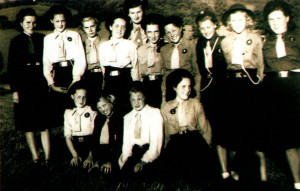
When war broke out in September 1939 I was a young teenage member of a local Girl Guide Company in Frome. During the early years we carried on as usual, albeit in difficulty thanks to the blackout and lack of heating.
The war had been going for two years when I left school and obtained a post in the Admiralty’s drawing office, then in Bath after being evacuated from London.
In Bath I became a member of the Ranger Unit of the Guide Movement. We helped, and when all youth leaders were called up for war work of various kinds, we took over the running of the various Brownie and Guide Units. We organised our programmes to make full use of first aid, gas drill and stirrup pump practising, message-carrying from one ARP post to another and use of the telephone (a novelty to most girls!).
At weekends and during holidays the Guides hiked into the countryside to gather nature’s free harvest – blackberries and sloes
for jam, and rose hips to be sent to the Ministry of Food to be made into syrup for under-fives. Young nettles became our spinach and other hedgerow herbs were used to flavour the whale meat from its fishy taste.
Small waste pieces of land were cultivated by Guides and produced most-needed vegetables, and at other times, with the old but trusty trek cart, the Guides could be seen collecting newspapers, rags, tins, jars, botdes and anything else required by the Ministry for the war effort.
Clothes rationing was in force, but somehow everyone managed to be in uniform – second-hand, different shades of blue, old styles maybe, but definitely Guide uniform.
For us Rangers it was not all work: most of us had some weekends free, so with equipment piled into the trek cart and our gas masks at the ready, we proceeded to push and pull the cart along the main road for
three miles outside Bath to a friend’s orchard, and camped there until the trek back on Sunday evening, giving us the much-needed break we valued in those dark days.
After the Second Front, but with the war still on in Europe, we were allowed to take the Guides camping on several weekends. Rations were a problem, food being in short supply everywhere, but mothers, feeling that their children would be better off in the countryside than the war-worn towns, would do their best to send at least one food item. With the aid of a few bread coupons and one or two ‘points’, the QM would come up with a menu – most often stew. I found that almost anything could be added to it, even if the taste sometimes was a bit queer!
There was one camp that I shall never forget, even though I’m now in my seventies. I was QM to a large Guide camp in the grounds of a big estate, where we had neither wireless nor newspapers. It came as a great surprise when two of the Guides I’d sent to the farm to collect our provisions came running across the field shouting: “It’s over! It’s over! The war is over!” At first we adults were stunned, and only when the Scouts came from a nearby camp with the same message did we believe it.
The landowner cut down a fir tree and the Scouts fixed it upright, and we had our camp fire that night in a blaze of light. Crowds of people came and joined in the singing and dancing.
The next morning, not having been able to sleep, I rose early and stood outside my tent watching the sun rise through the morning mist. All was quiet, and a single blackbird sang his tune. It was the first day of peace. We had won! We had come through!
Edna Brice








